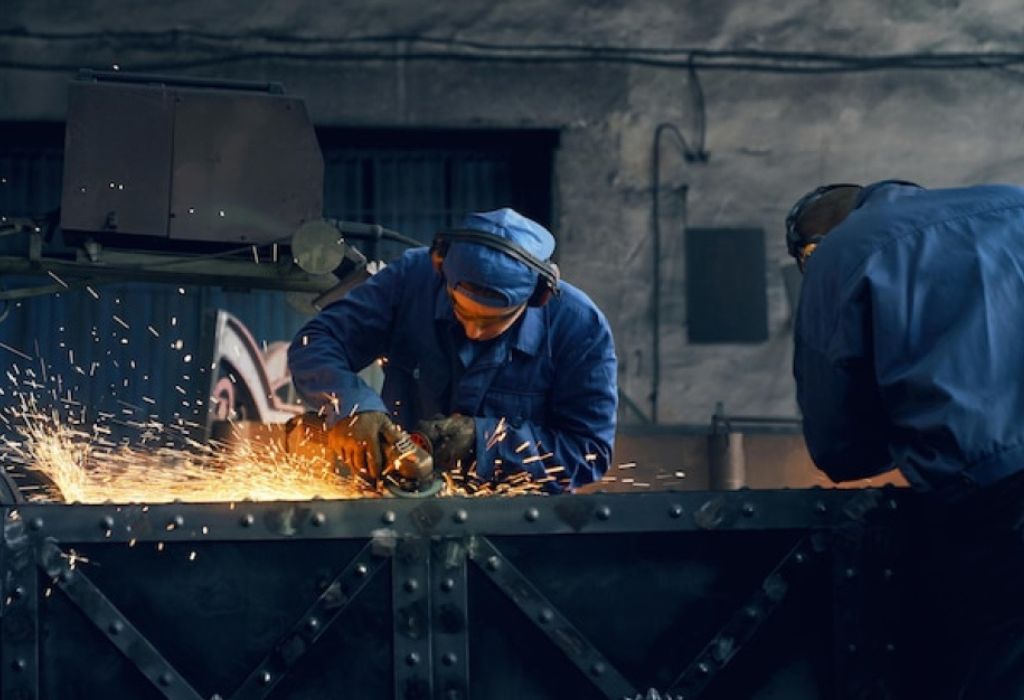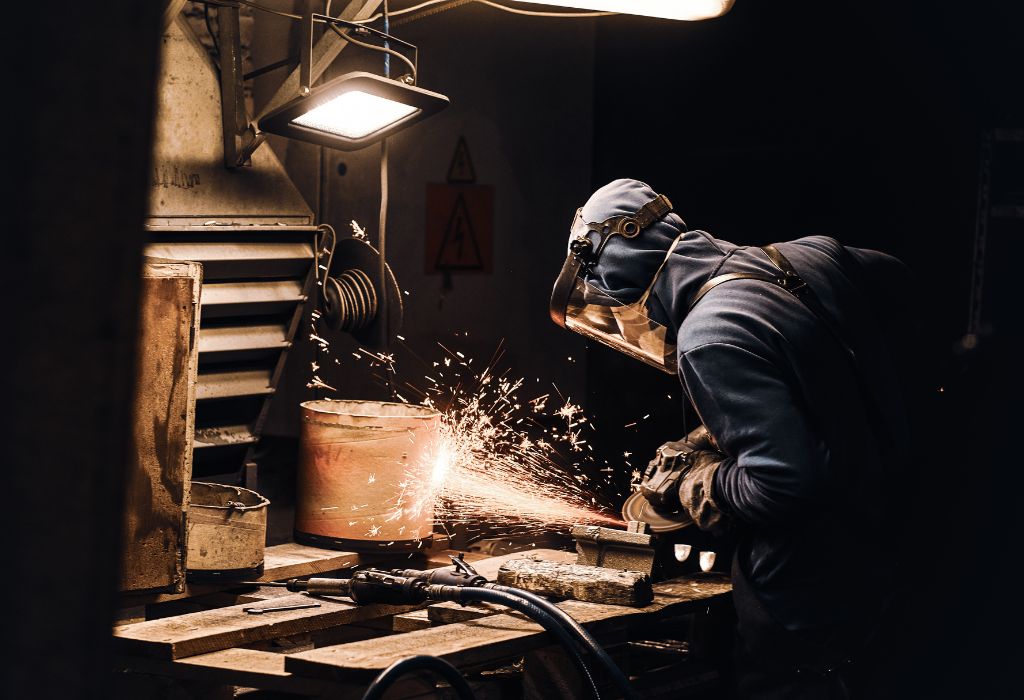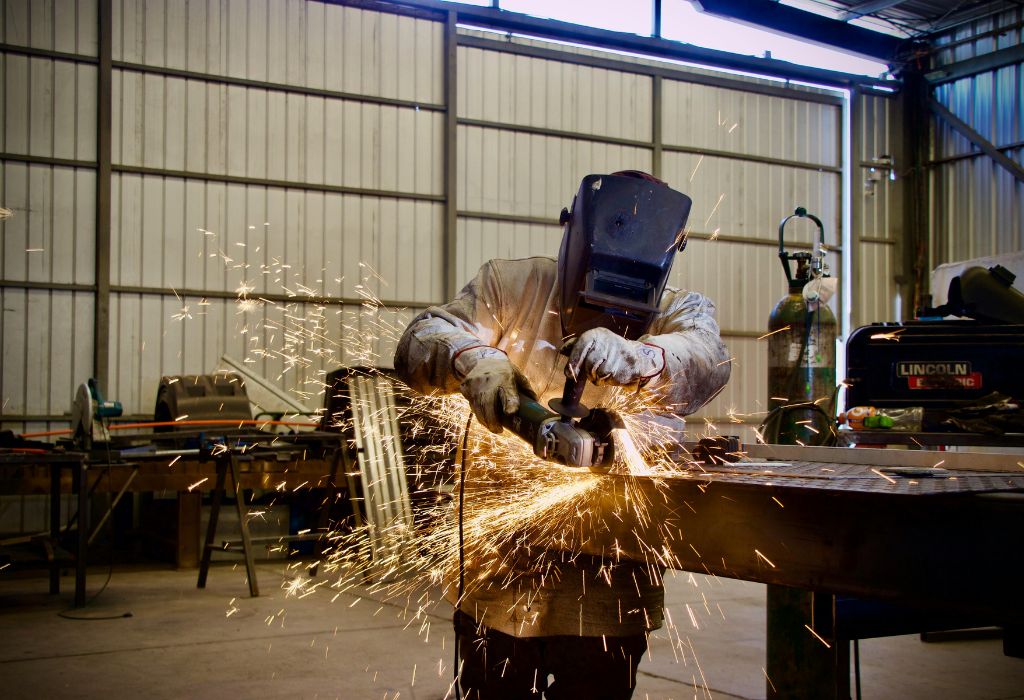Picture the skyline of a city filled with towering bridges, skyscrapers, and pipelines.
Behind each of these structures is the skill and dedication of welders who transform raw metal into strength and stability.
For many people, welding sparks curiosity as more than just a trade.
It offers a career path that blends technical expertise, creativity, and financial reward. Yet, the real question many ask is: what are the benefits of being a welder, and why is it such an attractive profession today?
The demand for welders is consistently strong. According to the U.S. Bureau of Labor Statistics, over 47,600 new welding jobs are projected by 2032, highlighting the ongoing need for skilled workers in construction, energy, and manufacturing (BLS).
This trend proves that welding isn’t just a temporary career—it’s a profession built on long-term stability.
Financial rewards are another major draw. Welders earn a median annual wage of nearly $49,000, with opportunities to exceed this figure in specialized fields like underwater or pipeline welding (BLS).
For those willing to gain certifications and take on challenging projects, the income potential grows even higher.
Beyond money, welding offers personal fulfillment. Welders take pride in building projects that last for decades, from bridges that connect cities to pipelines that fuel industries.
Each weld is a visible contribution to society, making the work both practical and meaningful.
This guide explores the many benefits welders enjoy, from financial stability and job security to personal satisfaction and career growth. Whether you are considering welding as a career or simply curious about the profession, understanding its advantages will help reveal why welders remain among the most valued tradespeople in the world.
What Does It Mean to Be a Welder?

Welding is more than just joining pieces of metal together. It is a skilled trade that combines science, precision, and craftsmanship to create structures that last for generations. From bridges and pipelines to vehicles and ships, welders play a vital role in shaping modern life.
There are several welding processes, each suited to different tasks. MIG welding is often used for automotive repairs, TIG welding is prized for precision in aerospace, and Stick welding is common in construction projects. Flux-core welding is valued in heavy-duty jobs requiring speed and strength.
Welders are found in almost every industry. Construction companies rely on them for infrastructure, manufacturers need them for product assembly, and even artists use welding to bring creative designs to life. Their work is both technical and versatile, making welding one of the most flexible trades available today.
What exactly does a welder do daily?
A welder fuses metal parts using heat and specialized tools to build or repair structures and equipment.
Is welding only for heavy industries?
No. While construction and manufacturing are major sectors, welders also contribute to art, design, and small-scale fabrication.
Do welders need formal education?
Not always. Many enter through trade schools or apprenticeships, gaining hands-on experience instead of traditional college degrees.
What are the main welding techniques?
The most common techniques include MIG, TIG, Stick, and Flux-core welding. Each serves unique purposes across industries.
Which industries hire welders the most?
Construction, oil and gas, shipbuilding, aerospace, and automotive are among the top employers of welders.
Financial Benefits of Being a Welder
One of the biggest attractions to welding as a career is its earning potential. Welders earn competitive wages without the burden of a four-year college degree. This makes it one of the most cost-effective skilled trades to enter.
The median annual wage for welders in 2024 is around $48,940, with opportunities to earn significantly more in specialized fields like underwater welding, pipeline welding, or aerospace welding (BLS). These niches often pay premium salaries due to the advanced skills and working conditions required.
Overtime and travel opportunities also add to a welder’s income. Many projects require long hours or remote work, and employers compensate workers with higher pay rates for these commitments. For welders willing to travel, the financial rewards can be especially lucrative.
Certification and experience directly impact earnings as well. Welders with advanced certifications in TIG or pipe welding often secure higher-paying contracts, while entry-level welders can quickly climb the pay scale with experience and skill-building.
How much do welders make starting out?
Entry-level welders typically earn between $35,000 and $45,000 per year, depending on location and industry.
Which welding jobs pay the highest?
Underwater welding, pipeline welding, and aerospace welding are among the most lucrative specialties.
Can welders earn extra through overtime?
Yes. Many welding jobs include overtime pay, shift differentials, and bonuses for travel.
Does certification increase pay?
Yes. Advanced certifications often lead to higher wages and more job opportunities.
Are welders paid weekly or monthly?
This depends on the employer, but most welders receive bi-weekly or monthly paychecks.
Job Security and Career Demand
Welding offers strong job security because the skill is required in almost every major industry. From building highways and bridges to manufacturing cars and airplanes, welders are essential to keeping industries moving.
An aging workforce is creating additional opportunities for new welders. Many experienced tradespeople are approaching retirement, opening the door for younger workers to step into secure positions.
Another advantage is that welding is difficult to outsource. While some industries automate certain tasks, welding still requires hands-on expertise, especially in complex or custom projects. This makes welding a career that is resistant to job loss from automation.
Global demand is also high. Countries with growing infrastructure needs, such as the U.S., Canada, Australia, and those in the Middle East, are constantly searching for qualified welders. This creates career options both locally and internationally.
Is welding a stable career?
Yes. Welding jobs remain in demand worldwide across multiple industries.
Why is welding in such high demand?
Because nearly every industry that uses metal requires skilled welders to build and maintain structures.
Are welders at risk of losing jobs to robots?
No. Automation can assist with repetitive tasks, but skilled welders are still needed for precision and problem-solving.
Which countries need welders the most?
The U.S., Canada, Australia, and the Middle East show some of the strongest demand.
Will demand for welders increase in the future?
Yes. Infrastructure growth and retirements will continue to drive demand for welders worldwide.
Personal Benefits of Welding Career
Beyond financial rewards and job security, welding provides a strong sense of personal fulfillment. Welders can look at buildings, ships, or vehicles and know their work is a permanent part of those structures. This creates pride and satisfaction that few careers can match.
Welding also offers opportunities for creativity. Every project is different, and welders must solve problems, make adjustments, and sometimes even create custom solutions. For many, this blend of technical skill and creativity makes the work engaging.
Travel is another perk of the career. Welders are often needed on job sites around the country or even internationally, giving them chances to see new places while earning competitive pay.
The welding community is close-knit, too. Working alongside other skilled tradespeople creates strong bonds and a sense of belonging within the industry.
Is welding satisfying as a career?
Yes. Welders enjoy the pride of seeing their work used in real-world projects.
Do welders get travel opportunities?
Yes. Specialized jobs in pipelines, shipyards, and offshore work often require travel.
Is welding considered creative?
Yes. Welders regularly solve problems and sometimes even design solutions.
Does welding build transferable skills?
Yes. Precision, safety awareness, and teamwork are valuable in many fields.
Do welders enjoy respect in their industry?
Yes. Welders are highly respected as essential skilled tradespeople.
Health and Lifestyle Benefits
Welding offers a lifestyle that keeps workers active and engaged. Unlike desk jobs, welding involves movement, lifting, and working with tools, which helps many welders maintain physical fitness.
The trade also provides independence. Many welders work on projects that allow them to control their schedules, especially in contract or freelance roles. This flexibility appeals to those who prefer hands-on work instead of office routines.
Problem-solving is another rewarding aspect of welding. Each project presents unique challenges, and welders gain satisfaction from finding practical solutions that directly impact results.
The lifestyle benefits also include confidence. Completing a project and seeing the visible outcome builds a strong sense of accomplishment. Over time, this creates lasting pride in the profession.
Does welding keep you physically active?
Yes. Welding requires movement, stamina, and strength, which help welders stay fit.
Is welding flexible with work schedules?
Yes. Some welders take contract jobs or shifts that offer more flexibility.
Can welding skills support freelancing?
Yes. Many welders operate independent businesses or side projects.
Is welding stressful work?
It can be challenging, but training and proper safety practices reduce stress.
Does welding help build confidence?
Yes. Creating tangible results gives welders pride and professional confidence.
Educational and Career Growth Benefits
Welding is one of the most accessible trades to enter because it does not always require a four-year college degree. Many welders begin their careers through trade schools or apprenticeships, which provide hands-on experience at a fraction of the cost of university education.
Career growth opportunities are strong in welding. With advanced certifications, welders can move into higher-paying specialties such as pipe welding, underwater welding, or aerospace welding. These areas require additional skill but also offer significant financial rewards.
Beyond hands-on welding, there are opportunities to grow into supervisory or teaching roles. Experienced welders often become inspectors, trainers, or managers, giving them new career paths as they advance.
The return on investment for welding education is high. Training programs can take as little as six months to two years, and graduates often secure jobs quickly due to industry demand. This makes welding an attractive career choice for those who want quick entry into the workforce.
Do welders need college degrees?
No. Most welders start with trade schools, apprenticeships, or short certification programs.
Can welders advance into management roles?
Yes. Experienced welders often become supervisors, inspectors, or trainers.
How long does it take to become a welder?
Training typically lasts from six months to two years, depending on specialization.
Do welders need continuous training?
Yes. Certifications and skills need regular updating as technology evolves.
Is welding a good alternative to university?
Yes. It provides strong earning potential without the heavy debt of a four-year degree.
Challenges vs. Rewards in Welding

Like any trade, welding comes with challenges. Exposure to heat, sparks, and heavy equipment can make the job demanding. Welders must also work in environments that vary from outdoor construction sites to confined spaces, sometimes under pressure or tight deadlines.
However, the rewards often outweigh the difficulties. Welders enjoy stable employment, strong earning potential, and the pride of contributing to projects that last for decades. Proper training and safety equipment minimize risks, making welding both manageable and rewarding.
Welding is also a skill that builds resilience. Overcoming challenges on the job develops confidence and problem-solving ability, which benefit welders in every aspect of their careers.
Is welding dangerous?
Yes, but risks are reduced with proper training and consistent use of safety gear.
What safety gear do welders use?
Standard gear includes helmets, gloves, aprons, boots, and respirators.
Can welders suffer from long-term health issues?
Only if they neglect safety practices such as ventilation and protective clothing.
Are the rewards worth the risks?
For many welders, the combination of good pay and personal satisfaction outweighs the challenges.
Do welding jobs provide safety training?
Yes. Most employers require safety training to ensure welders work responsibly and effectively.
Future of Welding Careers
The future of welding remains strong as industries continue to expand globally. Infrastructure development, renewable energy projects, and aerospace advancements all rely heavily on skilled welders. This ensures a steady demand for the trade in the decades ahead.
Automation and robotics are entering the welding industry, but rather than replacing workers, these tools act as assistants. Robots can handle repetitive tasks, while skilled welders focus on precision, problem-solving, and complex jobs that machines cannot manage.
Technological advancements are also creating new opportunities. Processes like laser welding and advanced fabrication are becoming more common, requiring welders to upgrade their skills to stay competitive. Continuous learning ensures welders remain valuable in a rapidly evolving industry.
Global demand further strengthens the outlook. Certified welders can find opportunities abroad, with countries in need of skilled tradespeople offering attractive contracts and benefits. This makes welding not just a local career but also an international opportunity.
Will robots replace welders?
No. Robots assist with repetitive work, but welders are needed for precision and complex projects.
What industries will need welders in the future?
Renewable energy, aerospace, construction, and infrastructure will continue to require welders.
Is welding a global career option?
Yes. Certified welders can work internationally where skilled trades are in demand.
Will welding technology keep evolving?
Yes. New techniques like laser welding and automated systems are emerging rapidly.
Should young people consider welding?
Absolutely. Welding offers stability, growth, and global opportunities for skilled workers.
Conclusion
Welding is more than a trade—it is a career that offers financial stability, job security, and personal satisfaction. Welders earn competitive wages, enjoy travel opportunities, and have access to diverse industries ranging from construction and automotive to aerospace and energy.
Beyond the paycheck, welding provides a sense of pride. Each project represents a visible contribution to society, whether it is a bridge connecting cities, a ship crossing oceans, or a pipeline delivering energy. Few professions allow workers to see the results of their skills as clearly as welding does.
The demand for welders remains strong worldwide, with industries continuing to expand and an older workforce retiring. This ensures long-term career opportunities for newcomers and experienced professionals alike. With proper training, certification, and commitment to safety, welders can build not only stable careers but also rewarding lives.
For those considering a future in skilled trades, welding stands out as a practical and fulfilling option. By investing in training and continuous growth, aspiring welders can secure a career that is both meaningful and full of opportunity.

I’m Darrell Julian, the founder, lead writer, and hands-on welding enthusiast behind ArcWeldingPro.com. With more than 15 years of real-world welding experience, I created this platform to share what I’ve learned in the field, in the shop, and in the heat of the arc.


